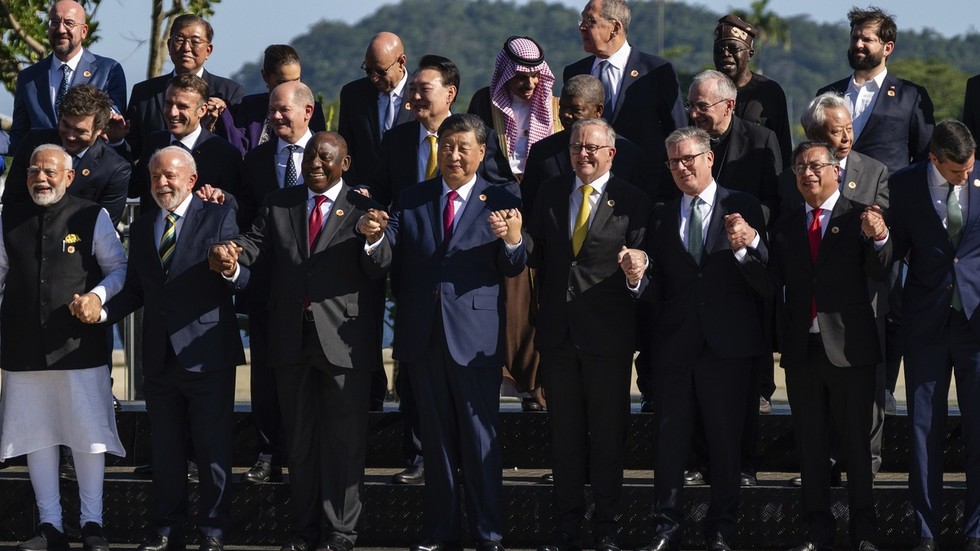At the recent G20 summit in Rio de Janeiro, a notable incident occurred when outgoing U.S. President Joe Biden missed the initial group photo of leaders, along with Canadian Prime Minister Justin Trudeau. Their absence was due to “logistical issues,” which led to a truncated family portrait showcasing other leaders prominently positioned while Biden and Trudeau missed the opportunity to participate. Observers interpreted this mishap as symbolic of Biden’s diminishing influence on the global stage as the world prepares for a potential return of Donald Trump to the presidency. Commentators pointed out the seating arrangements in the absence of Biden and Trudeau, noting the significance of the leaders who positioned themselves at the forefront during this gathering.
On the second day of the summit, Biden was able to participate in a subsequent group photo, this time standing prominently front and center between Trudeau and Indian Prime Minister Narendra Modi. This arrangement signaled a deliberate effort by the event organizers to ensure that Biden’s image was reintegrated into the collective identity of the G20. The presence of prominent leaders such as Brazilian President Luiz Inácio Lula da Silva and Chinese President Xi Jinping alongside their counterparts from India and Turkey reinforced the coalition of power dynamics among G20 nations. Italian Prime Minister Giorgia Meloni, who was absent from the first photo, stood adjoined to Trudeau, signifying the strategic placements aimed at maintaining a cohesive narrative of international cooperation despite initial disorganization.
Russian Foreign Minister Sergey Lavrov’s participation was notable, especially considering his absence from the second family photo. On the first day, he characterized the summit as a success for Moscow in resisting Western pressures, particularly regarding the ongoing crisis in Ukraine. Lavrov argued that the final communiqué, echoing the sentiments of several nations in attendance, was crafted in a manner that sidelined Western narratives and focused instead on themes such as global stability, food security, and cooperation across geopolitical lines. His remarks emphasized Russia’s role as a critical supplier of food and energy, aiming to assert that Russia continues to be actively engaged in addressing global challenges.
Among the key outcomes of the G20 summit, leaders agreed to establish a new coordinating body aimed at addressing global hunger and poverty. Lavrov confirmed Russia’s endorsement of this initiative and highlighted the importance of such collaborative efforts, particularly in light of the pressing socio-economic challenges exacerbated by conflicts and climate change. The agreement to tackle these global issues reflects a growing recognition of the interconnectedness of nations and the need for a consolidated response to crises that transcend borders, a notion that resonated throughout various discussions at the summit.
As the G20 convened with a backdrop of shifting political tides, the dynamics of international relations were palpable. Biden’s domestic and global standing seemed tested as he navigated the complexities of presenting a unified front with allies while contending with the looming prospect of a return of his predecessor, Donald Trump. This context added a layer of urgency to the discussions at the summit, as leaders sought to balance their national interests with the demands for cooperation on critical global issues like climate change, economic recovery, and health security.
Overall, the G20 summit in Brazil proved to be a microcosm of the evolving geopolitical landscape. The incidents surrounding Biden’s participation encapsulate the broader themes of influence, collaboration, and the ongoing challenges of multilateral diplomacy in a multipolar world. As nations grapple with their respective roles and responsibilities, the outcomes of such summits will likely shape the future trajectories of international relations. The mixed messages conveyed through group photo mishaps and the substantive agreements reached reflect the intricacies that leaders must navigate in their quest for unity and stability on the world stage.

